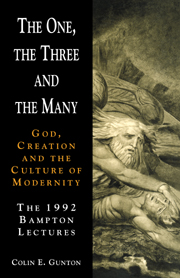Book contents
- Frontmatter
- Contents
- Preface
- Introduction
- PART ONE THE DISPLACEMENT OF GOD
- 1 From Heraclitus to Havel. The problem of the one and the many in modern life and thought
- 2 The disappearing other. The problem of the particular in modern life and thought
- 3 A plea for the present. The problem of relatedness in modern life and thought
- 4 The rootless will. The problem of meaning and truth in modern life and thought
- PART TWO RETHINKING CREATEDNESS
- Bibliography
- Index
2 - The disappearing other. The problem of the particular in modern life and thought
Published online by Cambridge University Press: 05 June 2012
- Frontmatter
- Contents
- Preface
- Introduction
- PART ONE THE DISPLACEMENT OF GOD
- 1 From Heraclitus to Havel. The problem of the one and the many in modern life and thought
- 2 The disappearing other. The problem of the particular in modern life and thought
- 3 A plea for the present. The problem of relatedness in modern life and thought
- 4 The rootless will. The problem of meaning and truth in modern life and thought
- PART TWO RETHINKING CREATEDNESS
- Bibliography
- Index
Summary
THE LOSS OF THE PARTICULAR IN MODERN LIFE AND THOUGHT
In the first chapter, two concepts, disengagement and displacement, were used to identify the main shape of modernity. It was argued that by disengaging human life from its worldly context, and by doing so in the context of the God of Christendom, modernity achieved a displacement of the divine. The outcome was indicated by using Heraclitus and Parmenides as figures representing philosophies of the many and of the one. The Western theological tradition, I argued, was strongly Parmenidean in much of its thrust, so that modernity has rebelled against God, the one, in the name of the many. But the outcome has been quite contrary to expectation. In many respects, modernity's rebellion has achieved the opposite of that which it set out to do. Various secular forms of divine order represent in many ways a worse slavery to the one than anything that past theologies once imposed. I ended by referring to Václav Havel's even-handed criticism of the modern ideologies of East and West. According to him, the consumer culture of the West is a mirror image of the repressiveness of the East, so that the danger for us is of a homogeneity – the herd culture – imposed by the very forces that the modern world has let loose. The room swept bare and garnished has been invaded by the deities of immanence, so that for every advance achieved in the modern world there appears to be a destructive and demonic counterpart.
- Type
- Chapter
- Information
- The One, the Three and the Many , pp. 41 - 73Publisher: Cambridge University PressPrint publication year: 1993
- 1
- Cited by



